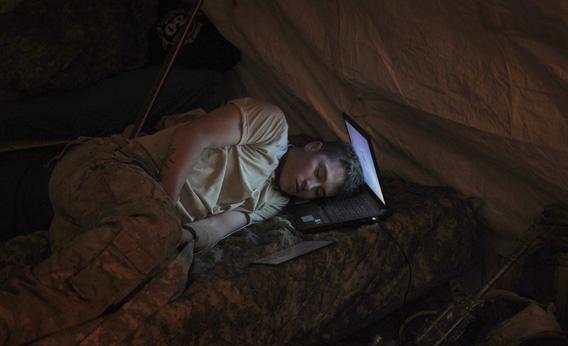A man who worked on a dry-docked Naval submarine in Maine is accused of causing $400 million in damage after setting two fires, one aboard the nuclear-powered USS Miami and one on the dock outside it. The shipyard painter, a civilian who faces a possible life sentence if convicted, told investigators he suffered from anxiety and committed the arsons to get out of work. Is it hard to get a sick day if you work for the military?
Only if you’re a soldier, sailor, airman, or Marine. While civilian employees generally have the same kind of leave policy most workplaces do, service members don’t enjoy the luxury of deciding for themselves whether they’re well enough to report for duty.
In most branches of the military, a service member who wakes up under the weather is expected to, well, suck it up. In extreme cases, though, he or she can inform the commanding officer of an ailing condition when reporting to first formation—a daily physical-training session at 6 or 6:30 a.m. that might include four-mile runs, push-ups, and sit-ups. It’s up to the commanding officer to decide whether to force the sick person to participate in the dawn routine or allow him or her to kill time with some stretching until sick call begins. Sick call, “a daily lineup of military personnel requiring medical attention,” takes place at the aid clinic, or infirmary. Enlisted medics assess the gathered troops, treat minor complaints, and issue further recommendations. An ailing service member might be assigned to “indoor” or “light” duty, which would exempt him from physical training and perhaps have him cleaning the barracks. Or he could be referred to the physician’s assistant for further evaluation. Depending on the severity and contagiousness of his symptoms, he might then find himself restricted to “quarters,” or put on bed rest. (Navy sailors so confined are known as SIQ: “sick in quarters.”) If the soldier’s illness is so serious the on-site medical personnel can’t treat him, he might be sent to a nearby hospital.
This general procedure applies to members of the Army, Navy, Air Force, and Marines, both in training stateside and in combat overseas. Yet there’s some evidence that a lenient officer can pre-empt the medics and let a sick subordinate off the hook. Air Force pilots, for example, are occasionally able to steal a free morning after a rough night by making a phone call to their supervisor. Still, troops would be advised not to fake it. Any service member who exploits—or is perceived to exploit—his unit’s leave policies (most branches cap sick leave at 13 workdays per year) risks being charged with malingering, which can result in dishonorable discharge, forfeiture of all pay and allowances, and confinement for one to three years. (The even dirtier word for a malingerer is a “chitmonger,” so called for the chits, or permission slips, the Department of Defense used to provide to Navy sailors seeking allowances.)
In addition to sick days, all members of the military receive 30 days of paid vacation per year in return for their service. Most apply for time off during spells of routine training at home. (The Navy also has a holiday-season policy that assumes a “lower state of readiness” during Christmas and Hanukkah—meaning a large group of sailors all get released from duty at once.) Securing vacation days proves trickier in the period right before deployment, which quickly fills up with inspections and preparatory exercises. And while troops are free to request time off during their tours of duty, such petitions are unlikely to be approved unless an immediate family member has died or fallen gravely ill. In that case, the service member might qualify for emergency leave, which can be granted (by no less authority than a first sergeant or unit commander) even if she has already used up her 30 days of vacation.
Got a question about today’s news? Ask the Explainer.
Explainer thanks Scooby Axson of the U.S. Army, David Larter of the U.S. Navy, Captain Jill Wolf of the Marine Wounded Warrior Regiment, Joel Harper of the U.S. Air Force, and Don Dees, a spokesman for the Fort Belvoir U.S. Army base.
Video Explainer: How Much Gold Leaf Can You Safely Consume?
This video was produced from an original Explainer by L.V. Anderson.
Want more questions answered? You can now watch video Explainers at Slate’s News Channel on YouTube.
